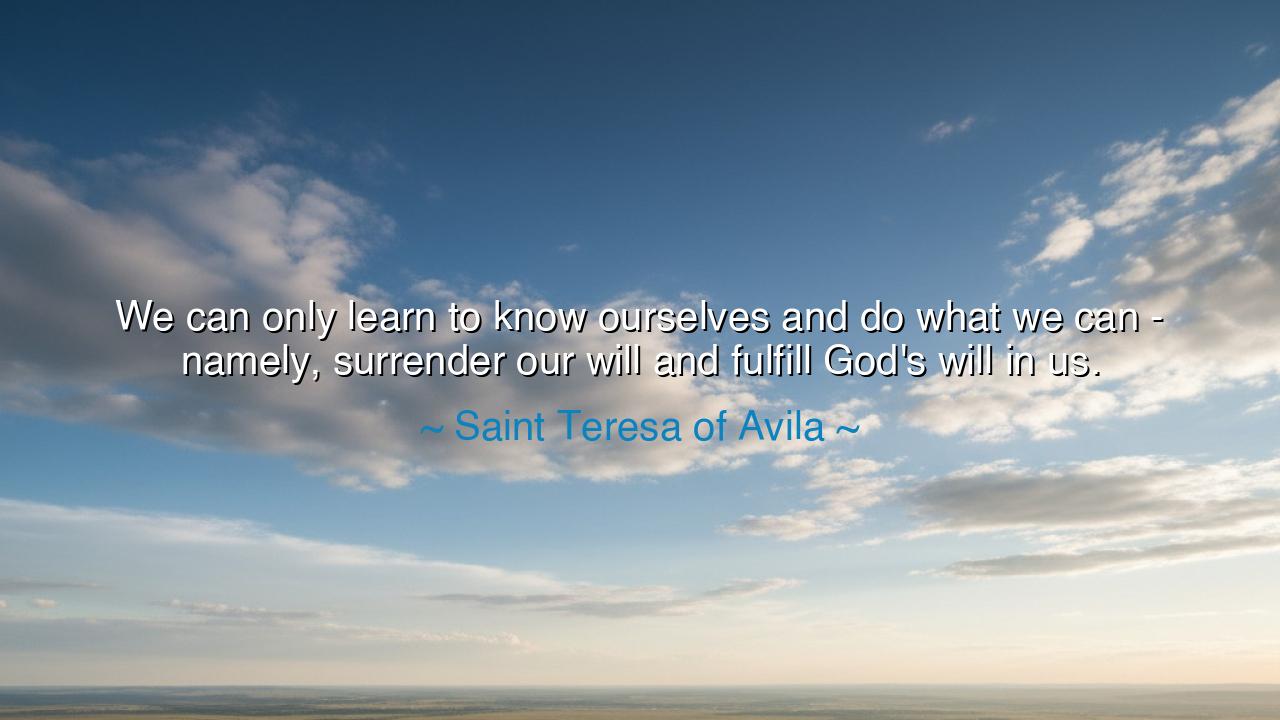
We can only learn to know ourselves and do what we can - namely
We can only learn to know ourselves and do what we can - namely, surrender our will and fulfill God's will in us.






“We can only learn to know ourselves and do what we can — namely, surrender our will and fulfill God’s will in us.” Thus spoke Saint Teresa of Ávila, the mystic flame of Spain, whose soul burned with the fire of divine union. These words, soft yet thunderous, are a guide for all who wander in the labyrinth of the self. For she teaches that the highest wisdom is not in conquest or intellect, but in surrender — that to know oneself truly is to yield to something greater, to become an instrument of the divine will.
Teresa, born in the sixteenth century, lived in an age of turmoil — a time when faith was threatened by pride, and the world sought to bind heaven in human understanding. Yet she withdrew into silence, into prayer, and from that silence wrote words that outlived kings. She knew the restless heart of humanity: forever striving, forever wanting, yet seldom still. Through long nights of suffering, she discovered that self-knowledge was not the end, but the beginning. For to see oneself clearly is to see the limits of human strength — and to fall humbly into the embrace of God’s grace.
When she says, “surrender our will,” she does not mean to abandon reason or lose our humanity. She means to align the little flame of our will with the great fire of God’s purpose. The river does not cease to flow when it reaches the sea; it becomes vast, endless, free. So too, when a soul yields its stubborn desires, it does not vanish — it is liberated. It learns to act not from fear or pride, but from love. This surrender is not weakness; it is the victory of peace over struggle, of harmony over chaos.
To understand her meaning, recall the story of Saint Francis of Assisi, who once walked the path of worldly pleasure and pride. One day, standing before the ruins of an old chapel, he heard the divine voice whisper: “Rebuild my church.” At first, he took the command literally and repaired stones with his hands. But soon he realized it was his soul, not the chapel, that God sought to rebuild. He gave away his wealth, cast off his silks, and clothed himself in humility. Through surrender, he became one of the freest and most radiant souls in history. His life echoed Teresa’s truth: when one releases the will into divine hands, one becomes part of a work far greater than oneself.
Saint Teresa also spoke of the “interior castle,” the soul’s journey inward through many chambers until it reaches the divine presence at its heart. Each chamber represents a deeper level of honesty, a stripping away of illusions. To walk this path is to face oneself — not the image one shows the world, but the truth hidden beneath pride, fear, and desire. Only in this humility does one hear the quiet voice of God within. And when that voice is heard, the soul no longer struggles; it simply obeys with love.
To fulfill God’s will in us is not to live as slaves, but as co-creators of goodness. It means to bring light where there is darkness, patience where there is anger, compassion where there is indifference. The divine does not demand perfection; it asks for openness. As a mirror reflects the sun only when polished, so too does the human heart reflect God when cleared of self. The act of surrender is thus an awakening — the soul realizing that its deepest desires were always divine in origin.
So, children of the spirit, take this teaching into your hearts: know yourself, but do not stop there. Knowledge without surrender breeds pride; surrender without knowledge breeds blindness. Seek both. In your labors, ask not, “What do I desire?” but “What is the will of the Highest moving through me?” In your trials, resist not with bitterness, but with faith that every hardship is a sculptor’s hand shaping the soul toward perfection.
For in the end, Saint Teresa’s wisdom is this: the greatest freedom lies in yielding to the divine rhythm. When you surrender the narrow will of self, you are not diminished — you are expanded. You become like the sky, holding all things, touched by light and storm alike, yet undivided. And when your heart moves in harmony with God’s will, your life itself becomes a prayer — silent, luminous, eternal.






AAdministratorAdministrator
Welcome, honored guests. Please leave a comment, we will respond soon